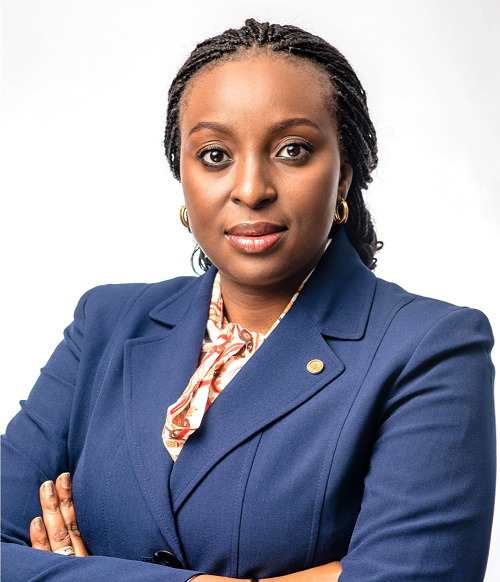Shareholders of Transnational Corporation of Nigeria Plc (Transcorp) have congratulated the Board and management for the resilient performance achieved in 2019, despite the challenging environment. They welcomed the diversified earnings provided by the Group, Nigeria’s leading listed conglomerate, the largest power generator in Nigeria, operator of sub-Saharan Africa’s largest hotel and a growing natural resources player.
Transcorp held its 14th Annual General Meeting (AGM) online, due to the Covid19 pandemic, a corporate first in Nigeria. Shareholders participated in the meeting through proxies and a total of 129 proxies representing holders of 21,450,062,121 ordinary shares of the company voted on the resolutions proposed by the directors to the shareholders.
The President/Group CEO of Transcorp, Owen Omogiafo set out her strategic ambition, whilst also committing to safeguard shareholder interests by ensuring improved dividends. Mrs. Omogiafo who was recently appointed as the Group CEO with a team of subsidiary CEOs stated that the new management team is dedicated to delivering and exceeding the strategic objectives of the Company, rooted in its founding vision and expressed in its corporate purpose of ‘Improving Lives, Transforming Nigeria’. She went on to say “in Hospitality, we will deepen and expand our market share by deploying an asset-light strategy, leveraging best in class technology and continuously drive the highest service standards. In Power, we target completing the ongoing transaction for the 100% acquisition of another power plant in the gas-rich Niger Delta Region of Nigeria – Afam Genco, this year. This will enhance our play in the power space, with increased generation capacity, revenue and profitability. Our drive to diversify our energy mix will also continue, with a focus on renewable energy and off-grid solutions. We will continue to monitor developments in the oil and gas space while making the best decisions in the interest of the company and its shareholders regarding the development of our oil and gas asset, OPL 281. Working with the MD/CEO of Transcorp Hotels Plc, Dupe Olusola and the MD/CEO, Transcorp Power Ltd, Chris Ezeafulukwe, and all our highly committed staff and partners, we are well-positioned as a group to continue to deliver great value for our shareholders”.
In his address to the shareholders, the Chairman, Transnational Corporation of Nigeria Plc, Tony O. Elumelu, CON, commended the efforts of the government in combatting the scourge of COVID 19 and reiterated the importance of synergy between the private sector and government, in stemming the spread of the global pandemic. “I’ve often said that our commitment to improving lives and transforming Nigeria is a lifelong one. Those words are truer today than ever, as we partner with State and Federal authorities to stem the tide of the COVID-19 pandemic, while our businesses seek to cushion its impact for Nigerians in their course of operation.”
The meeting was the first full virtual AGM to be held by any listed company on the Nigerian Stock Exchange. Shareholders viewed the decision to hold the AGM virtually, as a demonstration of the proactiveness of the company, efficiently and effectively channelling company resources. The Chairman, Progressive Shareholders Association of Nigeria, Boniface Okezie said in his comments during the meeting, “This virtual AGM – the first of its kind for a publicly listed company in Nigeria, reflects the level of innovation and technology adoption in our company. This is truly exciting!”
Transcorp achieved a turnover of ₦76.35bn and profit before tax of N7.90bn in the year under review. Revenue from its power business, Transcorp Power Limited declined during the period, reflecting acute gas supply issues, transmission challenges, delay in debt payment by government and continuing structural impediments in the sector. The company’s hospitality business, Transcorp Hotels Plc, on the other hand, grew its year-on-year revenue by 17% and gross profit increased by 19%, compared to FY 2018.
Mrs. Omogiafo concludes by highlighting that despite current challenges brought on by the global pandemic, the underlining strength of the Group’s businesses, the quality of its assets, its position as the leading Nigerian electricity producer, the proud owner of the Transcorp Hilton Hotel in Abuja, the hospitality gateway to Nigeria and its growing strength as an effective natural resources player, should give shareholders great confidence in the Group’s future. She thanked staff and management particularly for their dedication during the recent lockdown.
About Transcorp
Transnational Corporation of Nigeria Plc (Transcorp) is a publicly quoted conglomerate with a diversified shareholder base of over 300,000 investors, the most prominent of which is Heirs Holdings Limited, a pan-African proprietary investment company. The Transcorp portfolio comprises strategic investments in the hospitality and energy sectors. Our notable businesses include Transcorp Hilton Abuja; Transcorp Hotels Calabar; Transcorp Power Limited and Transcorp Energy Limited, operator of OPL 281.
For more information about Transcorp, please visitwww.transcorpnigeria.com





